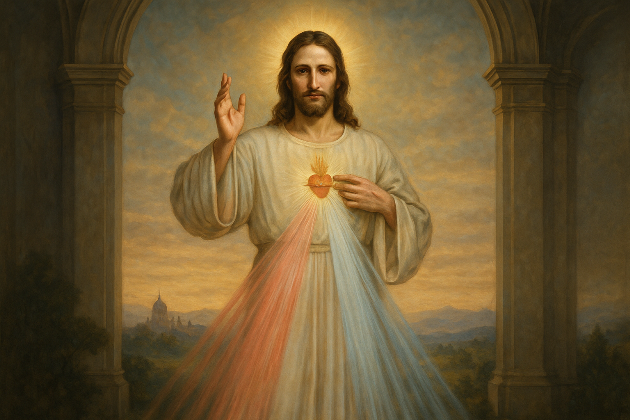Embracing the Heart of Mercy: A Call to Live Divine Mercy Sunday with the Spirit of Pope Francis

This weekend, the Church throughout the world stands together in celebration of Divine Mercy Sunday — a feast instituted by Saint John Paul II, but one that finds new depth and urgency today in light of the life and witness of our beloved Pope Francis, often called the Pope of Mercy.
As we gather on this Second Sunday of Easter, the Church invites us to gaze into the very heart of the Risen Christ — a heart that beats with inexhaustible mercy, a heart that continually calls each one of us to new life.
The readings for this day are an extraordinary tapestry, revealing that mercy is not just a beautiful idea — it is the very DNA of the Christian life.
Mercy Unleashed in the Early Church – Acts 5:12-16
In the First Reading, from the Acts of the Apostles, we see the fruits of Christ’s mercy breaking forth into the world.
The apostles, once timid and fearful, now boldly heal and bring wholeness to the broken. Their hands become extensions of Christ’s compassion:
“Many signs and wonders were done among the people at the hands of the apostles…” (Acts 5:12)
Healing, signs, and wonders—this is what happens when the Church lives out its identity as the Body of Christ, bringing His merciful love into wounded lives.
How deeply Pope Francis understood this! He constantly reminded us that the Church is called to be a “field hospital after battle”, a place where the hurting find healing, not judgment; where mercy, not bureaucracy, reigns supreme.
Singing the Eternal Mercy of God – Psalm 118
Our Responsorial Psalm echoes with ancient and eternal confidence:
“Give thanks to the Lord for he is good, for his love has no end.” (Psalm 118)
This refrain is not just a memory of the past; it is the anthem of the Church today.
Every breath we take is a testament to God’s unfailing love.
Pope Francis often said, “God never tires of forgiving us; it is we who tire of asking for His mercy.”
How different would our world look if we truly lived in the freedom and gratitude that comes from believing His mercy never ends?
Christ, the Living One – Revelation 1:9-13, 17-19
In the Second Reading, John shares a powerful vision from the island of Patmos:
“I am the First and the Last, the Living One. I was dead, and behold I am alive forever and ever, and I hold the keys of death and Hades.” (Revelation 1:17-18)
Mercy is not a passing feeling or soft sentimentality; it is rooted in the eternal victory of Christ.
His Resurrection is proof that mercy triumphs over judgment (James 2:13).
It is not weakness but the strongest force in the universe.
Pope Francis embodied this reality. Through initiatives like the Year of Mercy, the Jubilee of Prisoners, and countless humble gestures — embracing the sick, washing the feet of prisoners — he reminded the Church that mercy is our strongest weapon in a wounded world.
The Wounds that Heal – John 20:19-31
And then, at the heart of it all, the Gospel reading brings us into the Upper Room, where the Risen Christ stands before His frightened apostles.
What does He do?
He shows them His wounds. He does not hide them.
Mercy begins in vulnerability:
“Peace be with you. As the Father has sent me, so I send you.” (John 20:21)
And then He breathes the Holy Spirit upon them — giving them the power to forgive sins (John 20:22-23).
This moment is the origin of the Church’s mission of mercy.
We are not called to be gatekeepers of grace, but ambassadors of a forgiveness that cost Christ His very life.
Saint Thomas’ doubts remind us that faith often grows slowly. But Jesus meets Thomas in his weakness, offering His wounded side — not condemnation, but mercy.
Mercy Is The Beating Heart Of The Gospel
Pope Francis, too, never tired of calling the Church to be a place where even the doubters, the fallen, and the wounded are welcomed and healed.
His life was a living homily: “Mercy is the beating heart of the Gospel,” he proclaimed time and time again.
From the very beginning of his papacy, Francis made it clear that mercy was not just one virtue among many — it was the defining attribute of God and the lifeblood of the Church’s mission.
He declared the extraordinary Jubilee Year of Mercy in 2015–2016, inviting the entire world to rediscover God’s tender love.
During that year, he opened Holy Doors of Mercy not only in cathedrals, but in prisons, hospitals, refugee camps — symbolic acts proclaiming that mercy is not locked away in temples, but is meant to be unleashed in the places of deepest human suffering.
In his apostolic letter Misericordia et Misera (“Mercy and Misery”), Francis insisted that mercy is “the concrete action of love” and that the Church must “prioritize mercy above all judgment.”
He spoke forcefully against the Church becoming “an exclusive club,” reminding us that Jesus came not for the righteous, but for sinners (Mark 2:17).
Francis lived what he preached.
He regularly made unscheduled visits to slums, prisons, and centers for the disabled.
He washed the feet of prisoners — including women and non-Christians — on Holy Thursday, showing that no one is beyond the reach of God’s mercy.
He personally embraced migrants, the homeless, victims of abuse, the elderly forgotten by society.
He said:
“The Church must be a place of mercy freely given, where everyone can feel welcomed, loved, forgiven, and encouraged to live the good life of the Gospel.” (Evangelii Gaudium, 114)
Pope Francis constantly challenged us to move beyond our comfort zones, to go out to the “peripheries,” where mercy is most needed.
His vision of the Church was not one turned inward to its own security, but a Church risking everything to reveal the inexhaustible love of Christ.
In his words and actions, Pope Francis taught us that mercy is not weakness — it is the very power that changes the world.
A Challenge for Us Today
It is so easy for us as individuals, and even as a Church, to become comfortable — to circle the wagons around those who already “belong” and forget the many, many souls outside who thirst desperately for the mercy of Christ.
Mercy Sunday is not meant to stay confined to one day of the year.
It is a battle cry for the Church to rise and become what she truly is:
A vessel of the boundless love of God for all humanity.
The question today is not, “Will we receive God’s mercy?” —
but rather, “Will we allow ourselves to become instruments of His mercy for others?”
Will we step beyond our fears, our prejudices, our comfort zones?
Will we extend mercy to:
- The fallen away Catholic?
- The prisoner?
- The immigrant?
- The addicted?
- The poor?
- The person who hurt us most?
Because that is where Christ lives.
That is where the wounds of His Body still bleed.
And that is where Pope Francis continually pointed us.
Call to Action
As we celebrate Divine Mercy Sunday, let us not simply admire mercy from a distance.
Let us incarnate it in our daily lives.
- Go to confession.
- Forgive someone you’ve held a grudge against.
- Reach out to someone forgotten or rejected.
- Pray the Chaplet of Divine Mercy — not just for yourself, but for the whole world.
- Study the life and writings of Pope Francis to discover how vast and bold true mercy really is.
Be mercy. Live mercy. Witness mercy.
May the memory of Pope Francis stir our hearts to become a Church, a people, a family where no one feels beyond the reach of God’s love.
And may the cry of our hearts forever be:
“Give thanks to the Lord, for He is good, for His mercy endures forever!”
Prayer
Lord Jesus Christ,
on this Divine Mercy Sunday, we thank You for the immeasurable gift of Your mercy.
Breathe Your Spirit upon us anew, that we might be healers of wounds, sowers of reconciliation, bearers of hope.
Help us to walk in the footsteps of Your faithful servant, Pope Francis,
and to carry forward his dream of a Church that is poor and for the poor, a Church that is rich only in Your mercy.
May Your mercy be our light, our strength, and our mission — today and forever. Amen.






